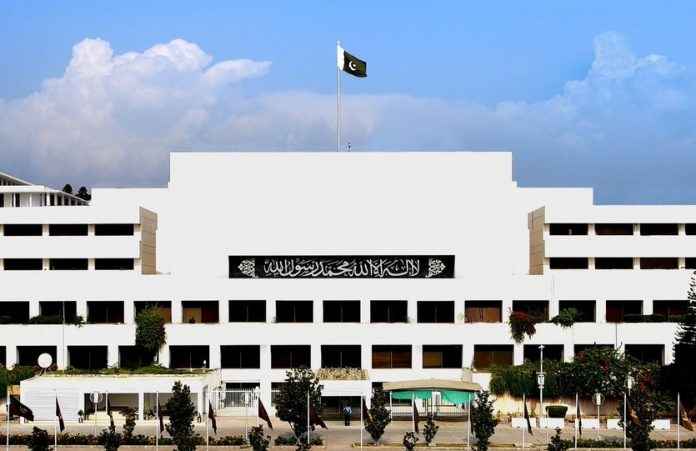DM Monitoring
ISLAMABAD: Pakistan’s National Assembly on Wednesday passed the momentous 27th Amendment bill with two-third majority as opposition staged walkout, media reported on Wednesday.
The proceedings were marked by intense political theatre, punctuated by the presence of prominent national leaders including Prime Minister Shehbaz Sharif, PML-N President Nawaz Sharif, and PPP Chairman Bilawal Bhutto-Zardari.
The bill, tabled by Law Minister Azam Nazeer Tarar, necessitated approval from the 336-member house by a two-thirds majority, a hurdle the ruling PML-N-led coalition appears poised to clear, given its considerable numerical strength of 125 (PML-N), 74 (PPP), and other allied seats, totaling a dominant position against the opposition’s 103 seats. This latest development follows the coalition’s successful maneuvering of the bill through the Senate earlier amid robust opposition resistance.
As Minister Tarar initiated his remarks, opposition members converged on the Speaker’s dais in a display of staunch dissent.
Bilawal Bhutto-Zardari Addresses the House
Following a brief interchange with the two Sharifs, PPP Chairman Bilawal Bhutto-Zardari addressed the Assembly. His speech was repeatedly marred by disruptive sloganeering from the opposition benches, predominantly PTI members, who championed party founder Imran Khan while brandishing his photographs. The opposition also vehemently protested by tearing up copies of the bill in the chamber.
Bhutto-Zardari commenced his address by solemnly condemning the recent surge in terrorist attacks across the nation. He implored all elected representatives to set aside political and ideological schisms and forge national unity to combat the country’s external and internal security threats.
Turning to the legislative substance, the PPP Chairman articulated that the 27th Amendment intends to realize the outstanding pledges of the Charter of Democracy, specifically referencing the establishment of constitutional courts and proposing amendments to Article 243, which includes constitutional protection for the rank of Field Marshal. He underscored the PPP’s commitment to achieving legislative consensus, mirroring their efforts during the landmark 18th Amendment and the original 1973 Constitution. He expressed a desire for a unified vote on the current amendment, acknowledging, however, that the government had secured the necessary majority but had been unable to forge that desired consensus.
Government Figures Castigate Dissent
In a spirited retort, Information Minister Attaullah Tarar castigated the opposition for their selective recollection of political history and their vociferous protest movement against the amendment during his speech in National Assembly. He took exception to the opposition’s appropriation of protest poetry, accusing them of selective morality and employing double standards. Tarar alleged that the PTI’s current objection to Parliament’s legal and political process for passing the amendment was hypocritical, juxtaposed against their past acceptance of what he termed “fascism” and the unconstitutional dismissal of the no-confidence motion in 2022.
27th Constitutional Amendment Clause-by-Clause Detail
According to details, clauses 1 to 3 were passed with 231 votes in favour and 4 against, while clauses 4 to 9 and 10 to 12 received 233 votes in favour and 4 against. Clauses up to 25 were approved by an overwhelming majority as the voting process progressed smoothly.
- Key Constitutional Changes
The amendment to Article 93, granting the Prime Minister the authority to appoint up to seven advisers, was passed with a two-thirds majority.
Similarly, Article 100 was amended to replace the word “Supreme” with “Federal Constitutional Court,” marking a major institutional change.
Amendments to Articles 114 and 130 were also passed, adding the mention of the Federal Constitutional Court and allowing provincial chief ministers to increase the number of their advisers.
- Abolition of Article 184 – Suo Motu Powers Shifted
One of the most significant steps in the amendment was the approval to abolish Article 184, effectively removing the Supreme Court’s suo motu powers.
The powers of suo motu action have now been transferred to the newly proposed Federal Constitutional Court.
The National Assembly also approved the deletion of Articles 186, 191A, and 193(3) from the Constitution with a two-thirds majority.
- Remaining Clauses Also Approved
Clauses 26 to 59, covering various legal and procedural adjustments, were all passed with a two-thirds majority. Each clause was approved during the session chaired in Islamabad as part of the ongoing constitutional reforms process.




